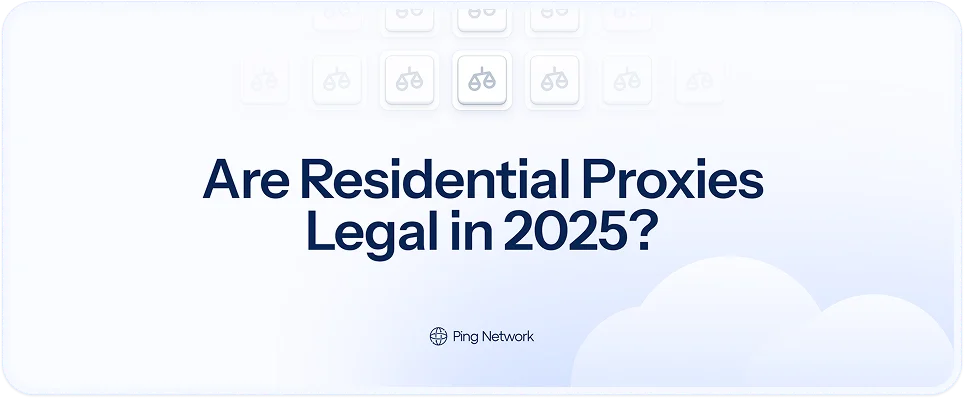September 25, 2025
Are Residential Proxies Legal? 2025 Guide to Safe and Compliant Use

TL;DR
Residential proxies are legal in most regions. The key is how you use them. Collect only public data, respect robots.txt and Terms of Service, avoid personal data without lawful basis, and follow privacy laws like GDPR and CCPA. Ping Network provides ethically sourced residential IPs, geo-targeting, and compliance-friendly controls so teams can operate safely at scale.
What Are Residential Proxies?
Residential proxies route traffic through IP addresses assigned by consumer ISPs to real households. Because they look like normal users, they are preferred for:
- Ad verification & brand protection — see ads the way real users do.
- Localization & UX QA — test city or country-level experiences.
- Price and availability monitoring — track SKUs across regions.
- Fraud & abuse research — observe behavior without exposing your own network.
Are Residential Proxies Legal?
Yes — when used lawfully. Proxies are neutral tools, like browsers or VPNs. Legality depends on conduct.
Lawful, low-risk uses
- Scraping or testing publicly available data without bypassing logins/paywalls.
- Ad verification, SEO checks, brand monitoring on open pages.
- Localization testing for compliance notices, banners, or translations.
- Security research on public assets with permission.
High-risk or unlawful uses
- Circumventing authentication or paywalls.
- Collecting personal data without consent or lawful basis.
- Running abusive automation (spam, credential stuffing, DDoS).
- Copyright infringement or breaching computer misuse laws.
Regional Snapshot (Non-Exhaustive, Not Legal Advice)
- United States: Proxies are legal. Misuse may fall under CFAA (Computer Fraud and Abuse Act) or ToS breaches. Privacy laws like CCPA/CPRA apply if personal data is collected.
- European Union & UK: Proxies are legal. If handling personal data, GDPR/UK-GDPR requires lawful basis, minimization, transfer safeguards, and in some cases, consent.
- Other regions: Laws differ. Some countries regulate circumvention of state censorship or telecom restrictions.
ToS vs. The Law: What Actually Governs You?
Think in three layers:
- Law: privacy, copyright, computer misuse.
- Contracts (ToS): site-specific restrictions on scraping, automation, or reuse.
- Technical Controls: robots.txt, rate limits, CAPTCHAs, paywalls.
Compliance Blueprint (Copy-Ready Checklist)
Policy & Scope
- Define purpose (QA, ad verification, research).
- Ban personal-data scraping or paywall bypassing.
- Collect only public fields (minimize).
- If personal data could appear, run GDPR/CCPA assessment.
- Review ToS and robots.txt.
- Apply crawl budgets and back-off strategies.
- Rotate IPs smartly.
- Use sticky sessions only when necessary.
- Respect local geos; do not evade logins.
- Keep lightweight logs (no sensitive content).
- Document vendors and retention periods.
- Train operators; audit regularly.
How Ping Network Helps With Compliance
Ping Network offers a decentralized proxy infrastructure designed for responsible, enterprise-grade use:
- Ethically sourced residential IPs from ISP routes.
- Geo precision down to country and city level.
- Smart rotation and sticky sessions to mimic real user behavior.
- Concurrency and pacing controls to respect site resources.
- Analytics & auditability to prove compliance in enterprise settings.
Use Cases (with Risk Levels)

Myths & Misconceptions
- “If data is public, it’s always legal.” Not true — copyright and database rights can still apply.
- “Proxies make everything anonymous.” Wrong — you still need a lawful basis.
- “Robots.txt doesn’t matter.” While not law, ignoring it raises contractual and ethical risks.
FAQs
Q1: Are residential proxies fully legal?
Yes. The tool is legal. Misuse is not.
Q2: Can I use proxies for geo-restricted streaming?
Testing and QA may be fine. Using them to access consumer content often breaches ToS.
Q3: Is scraping prices legal?
Often yes for public data, if you respect ToS and do not overload sites.
Q4: Do mobile or datacenter proxies change legality?
No. Legality is about usage, not IP type.
Q5: What about GDPR/CCPA?
Avoid personal data, or if unavoidable, document a lawful basis and set retention rules.
Conclusion
Residential proxies are legal and essential for modern businesses, from ad verification to localization QA. The key is responsible, compliant use.
Ping Network adds an extra layer of confidence by supplying ethically sourced residential IPs, geo targeting, smart rotation, and pacing controls — keeping your operations safe, efficient, and future-proof.
👉 Stay compliant. Scale responsibly. Ship faster.
Ping Network adds an extra layer of confidence by supplying ethically sourced residential IPs, geo targeting, smart rotation, and pacing controls — keeping your operations safe, efficient, and future-proof.
👉 Stay compliant. Scale responsibly. Ship faster.




